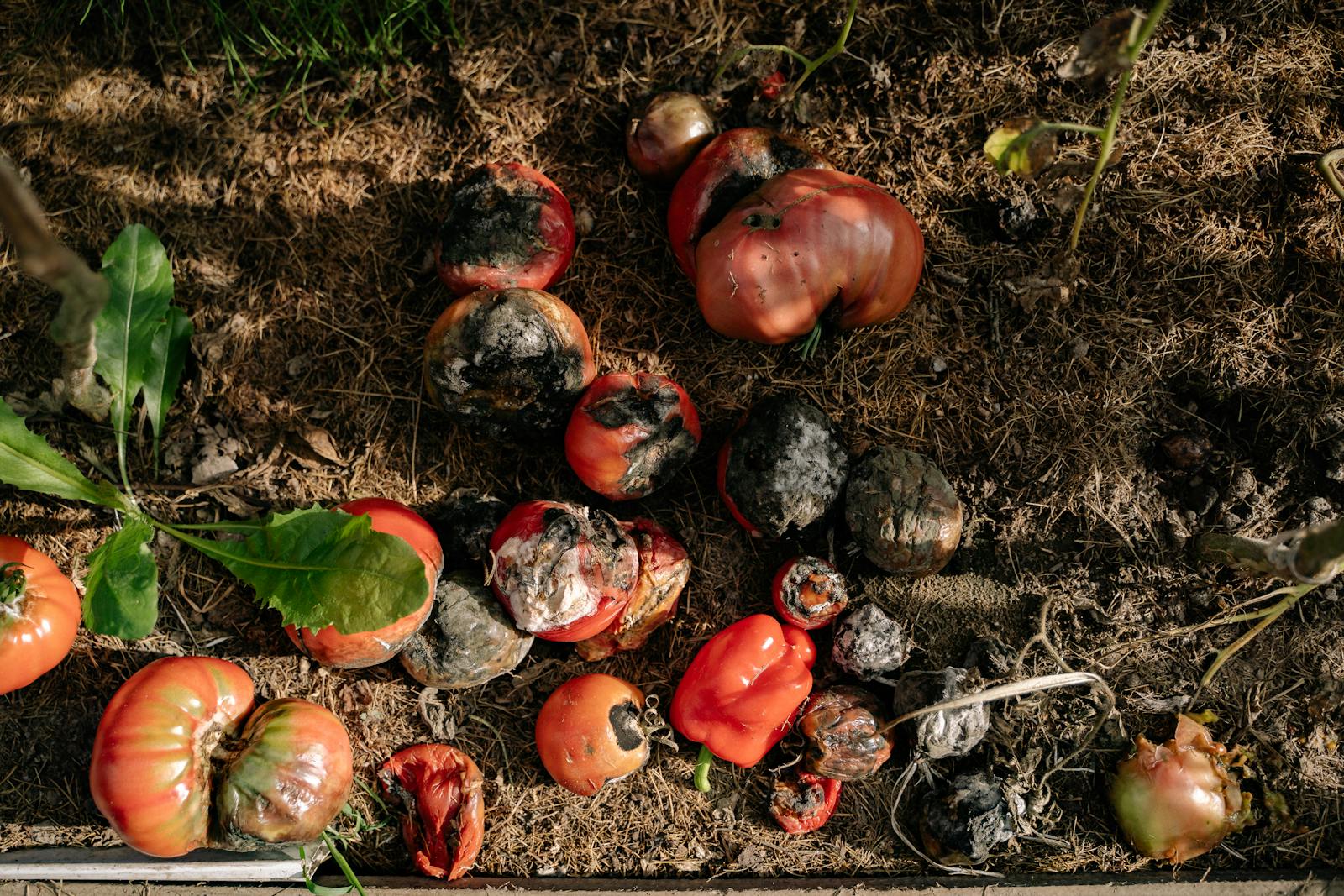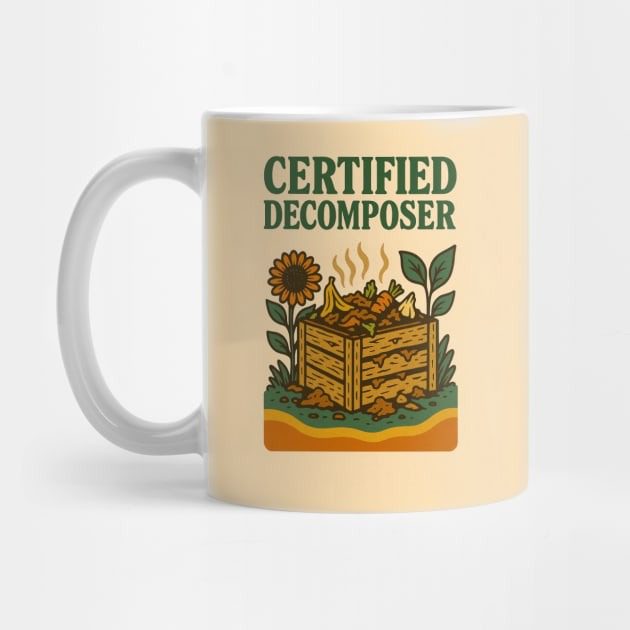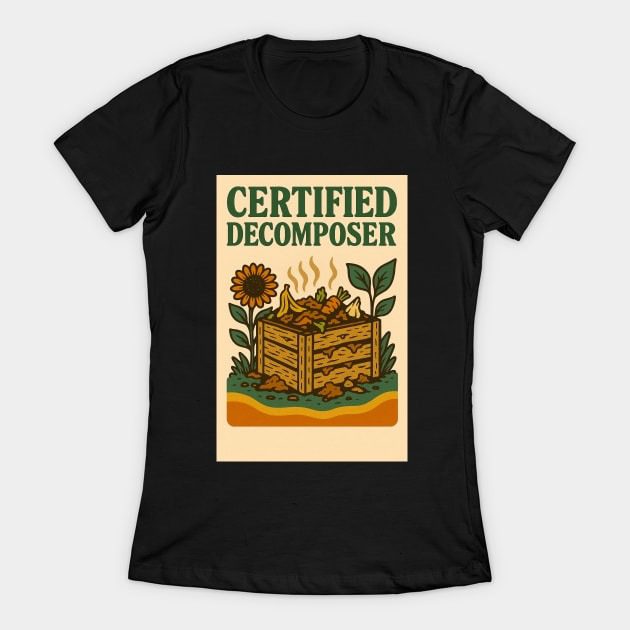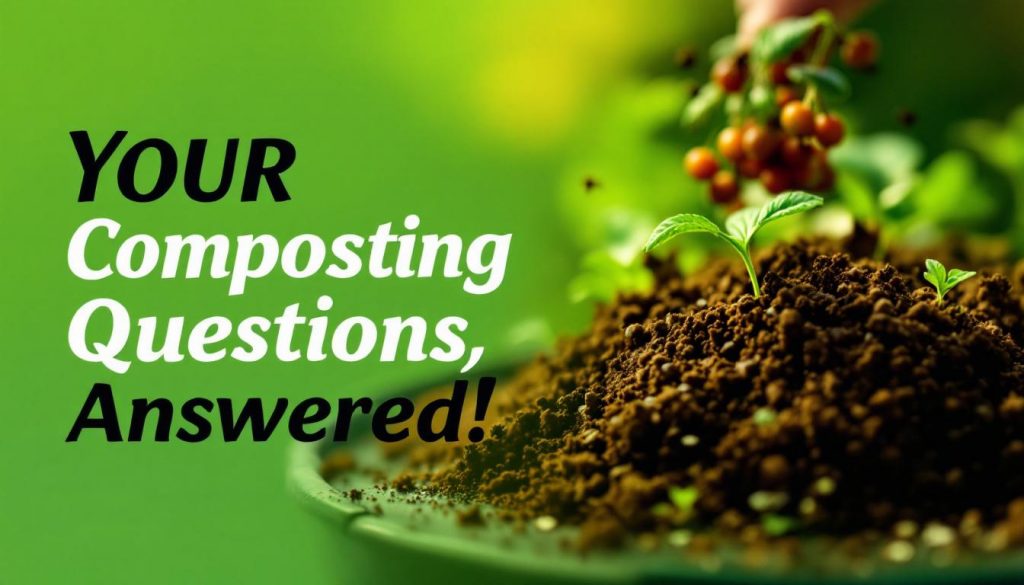(Plus Simple Tips for Every Bin, Tumbler, and Worm Farm)
Discover weird things you can compost, from old bread to pet hair. Add new items to your bin and help your garden grow with less waste.
Welcome!
Composting is a simple way to turn everyday kitchen scraps and waste into something amazing for your garden and the planet.
By recycling food scraps, paper, and natural materials, composting creates rich soil that helps plants grow strong and healthy.
It also prevents rubbish from entering landfills and reduces harmful greenhouse gases.
If you think you know what belongs in the compost pile, get ready for some surprises. There are plenty of weird things you can compost that many people never consider, from hair clippings to worn-out cotton socks.
You don’t need to be a scientist—or hold your nose! Composting, vermicomposting, and even using a compost tumbler can all be neat, easy, and perfectly clean at home.
Here’s what you’ll take away from this post:
- The basics of what composting is and why it’s great for the earth and your garden.
- A fun look at some of the weirdest compostable items for any compost bin, tumbler, or worm farm.
- Tips for making composting easier and less messy.
- Simple ways to get started, no matter your space or skill level.
Let’s discover how composting can be practical, fun, and maybe a little bit weird—in the best way possible.
What Is Composting and Why Should You Try It?
 Photo by Towfiqu barbhuiya
Photo by Towfiqu barbhuiya
Composting is simpler and more rewarding than you might think. It’s all about turning kitchen scraps, garden clippings, and other natural waste into valuable, nutrient-packed compost for your plants.
This isn’t just a chore for the super green-minded; it’s a fun way to see waste turn into rich, crumbly soil that helps gardens, pots, and even houseplants thrive.
Many people are surprised to learn about some of the weird things you can compost, from hairbrush leftovers to shredded cotton t-shirts.
But the basics—understanding what composting is and why it matters—set the stage for trying new and unusual additions to your bin, compost tumbler, or worm farm.
The Basics of Composting
At its heart, composting is a natural process. Microbes, worms, and tiny bugs break down organic material (anything from apple cores to cardboard) until it turns into dark, earthy goodness called compost.
There are several methods, but they all follow the same simple flow:
- Add your scraps (fruit peels, eggshells, coffee grounds, old leaves).
- Keep the pile moist and mix it occasionally.
- Let nature do the work as materials break down over time.
Tools like a compost tumbler or vermicomposting bin (where worms help speed things up) make composting tidy and faster.
Plus, they take up less space—great for patios, balconies, or anyone without much garden.
I’ll drink to Composting! Get this great design and more…
Why Bother With Composting?
If you toss food scraps in the bin, they go to landfill, where they slowly rot and produce methane—a powerful greenhouse gas.
Composting at home solves this problem while giving you rich soil to use in your garden or even on houseplants. There are solid reasons to compost:
- Reduces kitchen and garden waste (your bin won’t fill up nearly as fast!)
- Cuts down on landfill use and greenhouse gases
- Builds healthier soil so plants grow stronger and need less chemical fertilizer
- Keeps life in balance by recycling nutrients back to nature
If you’re curious about all the ways composting helps the planet and your backyard, check out the comprehensive guide on the benefits of composting at home.
Plus, starting small is easy—try your hand at making compost at home with a step-by-step beginner’s guide.
Weird Things You Can Compost
While banana peels and grass clippings get all the attention, the real fun in composting is discovering just how many odd things can go in the pile.
Ever think about composting vacuum lint, brown paper bags, or old cotton socks?
These so-called “weird” additions break down just like carrot tops. The secret is to avoid anything synthetic, oily, or non-organic.
Here’s a quick look at why embracing weird things you can compost is both funny and surprisingly practical:
- Cuts clutter by letting you recycle more at home
- Helps your compost pile get the right balance of greens and browns
- Reduces waste that’s harder to recycle otherwise
To get inspired, see the 6 most effective composting methods and start experimenting with your own compost tumbler, worm farm, or backyard heap.
Key Takeaways
- Composting is natural recycling—it’s easy and doesn’t need fancy equipment.
- Weird things you can compost expand what you toss, making your pile more effective.
- Tools like a compost tumbler or vermicomposting bin can simplify the process.
- Regular composting cuts waste, helps the earth, and boosts your garden.
- Starting is easy, even if you live in a flat or have a tiny garden.
FAQ: Composting Essentials
Q: What actually is compost? A: Compost is the result of natural breakdown of organic materials. It’s dark, crumbly, and smells earthy.
Q: Why should I compost things beyond food scraps? A: Adding “weird” items can help balance your compost and recycle more, making your pile even better for the environment.
Q: Can I compost in a small space? A: Absolutely! Tools like compact compost tumblers and vermicomposting bins make it easy, tidy, and totally doable in small homes or patios.
Q: Where can I find more beginner composting tips? A: Check out the composting calendar for seasonal tips or visit the Compost Charm Ask A Question tool for instant advice.
Q: Are there things I should never compost? A: Yes, avoid plastic, meat, dairy, and anything synthetic or oily. Stick with plant-based, biodegradable items.
Composting is as simple or creative as you want it to be—the best way to start is to toss in a few basics, keep an open mind, and enjoy every odd banana peel and coffee filter you save from the bin.
Weird Things You Can Compost: The Ultimate List
Composting is all about turning kitchen and household scraps into something your garden will love.
If you’re only tossing fruit peels and veggie tops into your compost, you’re missing out on a world of weird and wonderful things you can compost.
Let’s explore some surprising items that are easy to overlook but perfect for your compost bin, compost tumbler, or worm farm.
Surprising Food Scraps Beyond Fruit and Veg
 Photo by pasha kres
Photo by pasha kres
You probably know you can compost banana peels and carrot tops. But how about stale bread or last night’s plain pasta?
These oddball scraps break down well and add variety to your mix. In fact, giving your compost pile a wider variety of plant-based foods helps microbes do their job even better.
Some weird things you can compost include:
- Stale bread and plain pasta/rice (best to break up large pieces and keep it free of sauce or oil)
- Nut shells (like peanut or pistachio shells; crush them a bit first)
- Coffee filters and grounds (unbleached filters work best)
- Old spices (they lose flavor in the cupboard, but bring nutrients to a compost heap)
- Tea bags and herbal tea leaves (remove staples and synthetic string)
- Egg cartons (only cardboard and torn into smaller bits)
A few helpful tips for food scraps:
- Avoid large amounts of cooked food; stick with plain and minimal oils to keep your bin balanced.
- Chop or break larger items to speed up decomposition in your compost tumbler or heap. Small pieces mix and break down faster.
For an even longer list of surprising compost items, visit this handy guide to unexpected compostables.
Household Oddities You CAN Compost
Look around and you’ll notice that many everyday household items belong in the compost too.
These “weird” additions might seem odd at first, but they help balance out your compost’s carbon and nitrogen.
Here are some common (yet surprising) compostable household items:
- Paper napkins and paper towels (plain and unbleached, without cleaning chemicals)
- Natural cotton fabrics (like old T-shirts, socks, or towels—cut into smaller pieces and remove any synthetic tags or elastic)
- Shredded paper bills and envelopes (just watch for plastic windows or glossy finishes)
- Hair from hairbrushes or pet brushes
- Feathers (from pillows, duvets, or stray bird feathers outside)
- Used matches
- Vacuum dust (only if it’s from natural fiber carpets and not synthetic blends)
- Fireplace ash (add lightly, as too much can make your pile too alkaline)
Always remove synthetic parts from fabrics, envelopes, and any item with plastic.
Too much synthetic material can gum up compost and isn’t biodegradable.
To add more quirky items to your bin, check out the creative suggestions on surprising household compostables.
Garden and Pet Surprises for the Compost Bin
Your garden might be hiding some weird things you can compost.
Whether it’s cleaning up a flower bed or grooming your pet, you can find lots of new “ingredients” for your bin.
Try these odd yet compost-friendly additions:
- Dead houseplants, including roots and soil (unless diseased)
- Aquarium plants (as long as there’s no added salt or chemicals)
- Pet fur and nail clippings (from cats, dogs, guinea pigs, and even your own nail trimmings)
- Birdcage bedding (plain wood shavings or hay only; avoid anything with chemicals or scents)
- Certain pet bedding (shredded newspaper, straw, or hay from rabbits or hamsters)
Important health tip: Never add pet feces, kitty litter, or bedding from carnivorous animals. These can carry harmful bacteria and parasites.
A good rule—when in doubt, leave it out.
For more guidance on compost safety at home, the Compost Charm Don’t Toss It Campaign is packed with easy tips on safe composting and what to skip.
Key Takeaways
- The list of weird things you can compost is longer than you think and includes food, fabric, hair, and more.
- Many overlooked items help balance compost and cut down on waste.
- Always check for artificial or synthetic materials before adding something new to your compost.
- Be cautious with anything from pets—never compost feces or litter due to health risks.
- Boost your composting success with a variety of materials and try introducing new items you might not have considered before.
- For extra details on new compostables, practical tips, or seasonal advice, visit the Compost Charm composting calendar tips or use the free composting FAQ bot.
FAQ: Weird Compost Items
Can I compost bread and pasta?
Yes! Plain, stale bread and cooked pasta or rice are compostable. Tear or break them into pieces so they break down quickly. Avoid anything with sauce, fat, or lots of oil.
Is it safe to compost hair and nail clippings?
Absolutely. Both human and animal hair, plus nail trimmings, provide slow-release nitrogen. Just don’t add dyed or treated hair.
Are nut shells and eggshells okay for the compost bin?
Definitely. Nut shells (crushed up) and eggshells (rinsed and broken) add minerals and provide grit for worm bins.
Can I compost bills and old receipts?
Only plain, uncoated, and non-glossy paper goes in the compost. Watch out for thermal paper receipts and plastic windows.
What about pet bedding and birdcage contents?
If it’s made from newspaper, plain straw, or untreated wood shavings, it’s great for compost. Never add anything with pet poop or chemical additives.
Ready to try some of these weird things you can compost? Your garden—and the planet—will thank you!
Weird Things You Should NOT Compost—and Why
Composting at home can feel like an eco-friendly treasure hunt, but not every oddball item belongs in the bin.
Some things—including a few you might never expect—can mess with your pile, attract pests, or even introduce unwanted chemicals.
Let’s walk through some of the weird things you should keep out of your compost, and the simple reasons why leaving these out protects both your garden and the environment.
Meat, Dairy, and Grease: Not for Compost Bins

Photo by Dino
It’s tempting to toss a bit of leftover cheese, a chicken bone, or greasy pizza box into the compost.
Unfortunately, these foods don’t break down like fruits and veggies.
Instead, they can stink up your pile, attract rats and raccoons, and slow down the composting process—especially in backyard bins, compost tumblers, and even vermicomposting setups.
Items to always skip include:
- Meat scraps and bones
- Cheese or yogurt
- Bacon grease or oily foods
- Buttery baked goods
Stick to plant-based foods to keep your compost safe and easy to manage.
For more tips on safe composting, check out this reliable guide to the do’s and don’ts of composting.
Synthetic Materials: Plastics and Non-Natural Fibers
That old sock with a hole? If it’s 100% cotton, compost away. However, anything with polyester, nylon, or “stretch” belongs in the rubbish, not the pile.
Plastics, even tiny ones, never disappear in compost. They break into microplastics that linger in the soil and harm your garden over time.
Avoid composting:
- Clothing tags and elastic bands
- Glitter, sequins, or sparkly paper
- Plastic tea bags, wrappers, or produce stickers
Even if the packaging claims to be “biodegradable,” always check for non-organic ingredients. Only true plant-based or paper materials are safe for compost.
Cat and Dog Waste: Health Hazards Lurking
Some animal manures are garden gold, but pet poop is a big no. Waste from cats, dogs, or carnivorous pets can spread parasites and dangerous bacteria, even after composting.
This rule also goes for used cat litter, especially if it’s clay-based or scented.
Skip:
- Dog and cat feces
- Kitty litter (clay, crystal, or scented)
- Sawdust from animal cages (if mixed with pet waste)
If you want to learn about adding safe amendments to your compost, see the Compost Additives Guide.
Glossy, Coated, or Colored Papers
While most plain paper is compost-friendly, glossy magazines, gift wrap, stickers, and wax-coated cartons contain plastics or chemicals that don’t break down.
These can leave toxins behind and spoil the finished compost.
Avoid composting:
- Gift wrap with metallic or shiny surfaces
- Stickers and labels (like those on fruit)
- Magazines or photo paper
- Waxed or plastic-coated cartons
Stick with plain, uncoated papers, cardboard, and simple napkins for the safest compost pile.
Diseased Plants and Persistent Weeds
Pulling weeds or clearing out sickly plants from the garden? Tossing everything into the compost can create problems later.
Some plant diseases (like powdery mildew or tomato blight) survive ordinary backyard composting and could spread when you use your finished compost.
Don’t add:
- Plants with obvious disease (yellow, spotted, or slimy leaves)
- Weeds with developing seeds (unless you use a hot compost method)
- Invasive plant roots that might re-sprout
For more helpful info about keeping a healthy and safe pile, discover why temperature matters in composting.
Chemical Products and Treated Wood
It may seem like a good idea to break up that old painted bench or vacuum up fireplace ash, but many wood treatments and modern paints bring in toxic metals and chemicals.
These can poison your soil and harm plants and even pets.
Skip these:
- Painted or pressure-treated wood chips
- Fireplace ash from treated wood, glossy logs, or coal
- Vacuum dust from synthetic carpets or recent chemical cleaning
For safe wood options, learn more from the guide to using wood chips in compost.
Table: Weird Items You Should Not Compost
A quick-glance guide for easy reference.
| Item Type | Example | Reason to Avoid |
|---|---|---|
| Animal products | Meat, cheese, bones | Attracts pests, smells bad |
| Plastics/synthetics | Clothing tags, produce stickers | Never break down, pollute soil |
| Glossy paper | Magazines, gift wrap, coated cartons | Adds toxins, doesn’t decompose |
| Pet waste | Cat/dog poo, used litter | Hazardous bacteria, parasites |
| Diseased plants | Blighted leaves, invasive weeds | Can spread disease/weed seeds |
| Treated wood/ash | Painted lumber, stained chips | Toxic to plants and animals |
Key Takeaways
- Not everything that looks compostable is safe for your bin, tumbler, or vermicomposting setup.
- Meat, dairy, plastics, and coated products can cause odors, pests, and pollution.
- Avoid pet waste and chemically treated items to keep your compost and garden safe.
- If in doubt, leave it out, and check reliable resources or the Compost Charm composting FAQ bot for quick answers.
Weird Things You Should NOT Compost—FAQ
Can I compost bread with mold?
Yes, as long as it’s plain and not slathered with butter or cheese. Mold won’t harm your pile.
Are biodegradable plastics safe for compost?
No, most need special facilities and don’t break down well at home.
Can I compost dead pets or roadkill?
No, this is unsafe and can introduce disease.
Is fireplace ash good for composting?
Only in tiny amounts, and never from coal or treated wood.
What about paper towels with cleaning chemicals?
Avoid them, as the chemicals can harm the composting microbes and end up in your garden soil.
With these guidelines, you can fill your compost with all the right weird (and safe) things, while keeping the troublemakers out.
How to Compost Weird Stuff Safely: Tips for Every Method
Everyone who composts has had that moment—staring at something odd in their hand and wondering, “Can this go in the compost too?”
The answer is often yes, but there are safe ways to add those unusual bits, no matter which composting method you use.
Whether you’re tossing scraps into an old-school heap, working with a compost tumbler, or letting worms handle things with vermicomposting, a few safety tips go a long way.
Let’s break down exactly how to compost weird things with confidence, so you can expand your compost pile without worry.
Safety First: General Tips for Unusual Additions
Before you get wild with your compost, keep these basics in mind:
- Double-check for synthetics. Weird items like hair, fabric, or even nail clippings are often mixed with artificial materials. Only pure cotton, wool, or silk belong in your pile. Polyester or anything stretchy should skip the compost, as those materials won’t break down.
- Prep items for faster breakdown. Chop, shred, or crush weird compostables. Smaller pieces break down faster in a compost tumbler or worm bin.
- Add in moderation. Even natural “weird” items, like pet fur or brown napkins, should be sprinkled in rather than dumped in big piles. Balance is key to happy microbes and worms.
- Watch for food contamination. Anything with grease, dairy, or meat (such as pizza boxes or sandwich wrappers) should stay out of your home bin.
- Check safety for kids and pets. If you’ve got curious little ones or pets, keep your pile safe. More tips are available in the guide on Compost Safety Tips for Children and Pets.
How to Add Weird Things to a Classic Compost Pile
 Photo by Kaboompics.com
Photo by Kaboompics.com
Traditional compost heaps or bins are forgiving, but some rules help:
- Layer your odd additions with regular greens (like veggie peels) and browns (like dried leaves or paper). This balances moisture and keeps things from getting smelly or slimy.
- Mix new materials in well. Don’t just pile feathers or old cotton socks on top—fluff them in with your usual waste.
- Respect the “No List.” Avoid anything greasy, meaty, or synthetic. For example, composting hair is fine, but hair with lots of leftover gel may be better left out.
Weird compostables like human hair, nail clippings, and used matches can all go in a classic heap if prepped and mixed smartly.
Tips for Compost Tumblers: Keep It Spinning and Clean
If you’ve got a compost tumbler, you’re all about easy turning and less mess.
Tumblers make composting weird things tidier but need a little extra care:
- Cut everything small. Tumbler compost likes even pieces so all materials get mixed. Large bits of paper, old clothes, or shells will slow the whole process.
- Balance moisture: Some weird things (like vacuum lint or shredded cotton) suck up lots of water. Too much, and your pile dries out. If things look dusty or packed, chuck in some kitchen scraps or a spritz of water.
- Avoid heavy items. A tumbler packed with tough shells or sticks can be hard to turn. Sprinkle weird bits in lightly.
- Check for odors. If you smell anything funky, it usually means too much wet material or not enough air. Open it up, add dry “browns,” and give it a spin.
You can get inspiration from more Easy Low-Effort Compost Systems if you need a break from heavy mixing.
Special Pointers for Worm Composting (Vermicomposting)
Worms are picky eaters but love a bit of variety. Here’s how to keep them happy with weird things you can compost:
- Go plant-based and chemical-free. Worms are sensitive to soaps, perfumes, and cleaning products. Only add weird stuff that’s clean and natural—think plain cotton, crushed eggshells, or old herbal tea.
- Chop or shred. Worms have tiny mouths. Tear everything into little pieces.
- Watch protein and fat. Even weird food like plain pasta or bread is okay (in small bits), but never toss anything with meat, cheese, or lots of oil.
- Monitor bedding mix: Add unusual items (like vacuum lint or hair) as part of worm bedding, but mix with paper or coir. Too much hair can tangle or mat in the bin.
Table: Weird Things You Can Compost Safely By Method
| Weird Item | Classic Pile | Compost Tumbler | Vermicomposting |
|---|---|---|---|
| Human/animal hair | Yes | Yes | Small pieces only |
| Cotton fabric (no tags) | Yes (small) | Yes (shredded) | Yes (tiny bits) |
| Tea bags (no staple) | Yes | Yes | Yes |
| Crushed eggshells | Yes | Yes | Yes |
| Nail clippings | Yes | Yes | Yes |
| Vacuum lint (natural) | Yes (small) | Yes (blend in) | Yes (small mix) |
| Nut shells | Yes (crush) | Yes (crush) | Tiny pieces only |
| Feathers (natural) | Yes | Yes | Yes (chopped) |
Note: When in doubt, start small and see how your pile or worms handle a new material.
Key Takeaways
- Chop, shred, and sprinkle weird things rather than dumping them in all at once.
- Stick with natural, non-treated, plant-based compostables.
- Let each composting method guide how you prep and add new items.
- Check materials for safety if kids or pets might get curious.
- Use worms and tumblers for a clean, tidy compost experience, but watch for moisture and size.
For practical guides on composting safely for all, see Compost Safety Tips for Children and Pets or get ideas for Easy Low-Effort Compost Systems.
Your garden will thank you, and even the weirdest compostables can find a place if you follow these steps!
Conclusion
Weird things you can compost prove that almost nothing organic needs to go to waste.
By adding everything from hair clippings to cotton socks, you help create richer compost and shrink your rubbish pile.
Composting, whether you use a classic heap, a compost tumbler, or vermicomposting, can be as quirky and fun as you make it.
Take a look at some top strange items for your bin:
- Hair and pet fur
- Shredded cotton fabric (no synthetic bits)
- Nut shells and eggshells (crushed)
- Coffee filters and tea bags (without plastic)
- Paper napkins and vacuum dust (from natural fibers)
- Dead houseplants, nail clippings, and natural feathers
Each odd compostable cuts waste, adds nutrients, and mixes up your routine.
Composting weird stuff is not just about cleaning out junk drawers; it helps you live more sustainably and see everyday rubbish in a whole new light.
Making compost at home is easier and more cheerful when you get creative. It turns chores into something genuinely rewarding.
If you want to keep up the green momentum, check out the Don’t Toss It Campaign for more community stories or use the Composting FAQ Bot for personalized answers.
You might just discover your new favorite thing to compost.
Get this great design TODAY and impress your friends at the allotment!
Key Takeaways
- Composting is simple, sustainable, and can handle way more than veggie peels.
- Using a compost tumbler, vermicomposting, or traditional heap all works for weird compostables—just follow basic safety steps.
- Odd items often balance your compost, speed up decomposition, or add valuable nutrients.
- Every strange addition means less landfill and a healthier garden.
- You can start small and get instant, tailored guidance from the Composting FAQ Bot for any wacky compost question.
Weird Things You Can Compost — FAQ
Can I compost my old T-shirt?
If it’s 100% cotton, yes! Just cut off tags and elastic, then shred into small strips.
Is vacuum dust okay to add?
Only if it’s from natural fiber carpets, not synthetic blends or recent chemical treatments.
Will composting hair scare off worms?
Nope! Worms love a little hair in their diet, as long as it’s in small bits.
What’s the oddest thing you’ve composted?
People have composted everything from Thanksgiving wishbones (not recommended) to pencil shavings. You’ll find some surprises in your own home.
Can I get help if I’m not sure about something weird?
Absolutely. Try the Composting FAQ Bot for fast answers, or explore experiences in the Don’t Toss It Campaign for community-tested tips.
Ready to toss something unexpected in your compost bin?
Composting weird things makes the process even more rewarding—and just a bit more fun.
Thank you for exploring these creative composting ideas.
Your effort to recycle and try new things turns waste into a real win for your home, your soil, and the planet.







